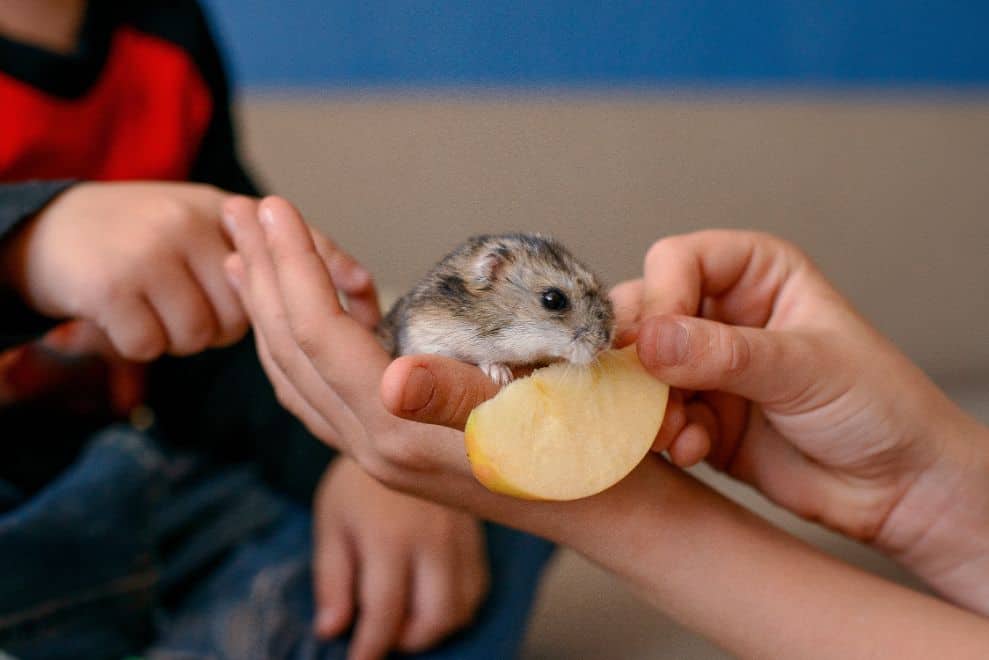If you are a hamster owner, or considering becoming one, it’s natural to wonder if your furry little friend likes to be held. Hamsters are adorable, active, and curious pets that can make great companions, but their nature and personality can vary.
In this blog post, we will dive into the world of hamsters to understand their nature, how to build trust with them, and answer the question, do hamsters like to be held?

The Nature of Hamsters
Hamsters are rodents that prefer to live alone. They are territorial by nature and can become aggressive towards each other if housed together. Hamsters have a natural instinct to run and explore. They are active at night and sleep during the day. These little creatures are curious and love to investigate their surroundings. Hamsters also have a strong sense of smell and use it to navigate their environment.
Do Hamsters Like to be Held?
Hamsters may enjoy being held, but it’s not a universal trait. Some hamsters may feel scared or stressed when lifted off the ground. It’s crucial to understand your hamster’s personality and body language to determine if they are comfortable being held.
How Hamsters Interact with Humans
Hamsters may interact with humans in different ways. Some hamsters may enjoy cuddling and being petted, while others may prefer to explore their surroundings. It’s essential to respect your hamster’s preferences and not force them to do something they don’t like.
Syrian hamsters are typically more receptive to being handled than dwarf hamsters and Chinese hamsters.
Handling Hamsters Safely and Comfortably
When handling a hamster, it’s crucial to do it in a safe and comfortable way. You should always support their entire body, including their tail.
Never lift a hamster by the tail or the scruff of their neck, as this can cause them pain and stress. Use both hands to hold them gently, and keep them close to your body to provide a sense of security.
Signs that Your Hamster May Not Enjoy Being Held
If your hamster is not comfortable being held, they may show signs of distress. Some common signs include biting, scratching, or trying to escape. Your hamster may also freeze, squeak, or urinate when picked up. These behaviors indicate that your hamster is not comfortable and may need more time to build trust with you.
Alternatives to Holding Your Hamster
If your hamster does not enjoy being held, there are several ways to interact with them. You can offer them treats or toys, play with them in their cage, or let them explore a safe space outside their cage. The key is to provide your hamster with positive experiences that they enjoy.
Understanding a Your Hamster
As mentioned earlier, hamsters have a unique personality that can vary from one individual to another. Some hamsters are outgoing and friendly, while others may be shy and timid. Understanding your hamster’s personality is crucial to provide them with the right environment and care.
Factors that Affect a Hamster’s Temperament
Several factors can affect a hamster’s temperament. Genetics, early socialization, and previous experiences can play a significant role in shaping their personality. For instance, hamsters that have been handled gently and frequently since birth may be more comfortable with human interaction than those that have not.
Knowing Your Hamster’s Personality
Observing your hamster’s behavior can help you understand their personality. You can notice their likes and dislikes, their activity level, and their attitude towards you. Some hamsters may enjoy being held, while others may not. It’s crucial to respect their individual needs and preferences.
How to Build Trust with Your Hamster
Building trust with your hamster is essential if you want to develop a strong bond with them. You need to be patient, gentle, and consistent in your interactions. Gradually introduce your hamster to your scent by placing a piece of clothing or fabric in their cage.
Offer them treats, such as small pieces of vegetables or fruits, to encourage positive associations with you. Spend time near their cage to get them used to your presence. Once your hamster is comfortable with these interactions, you can try to pick them up slowly and gently.
Conclusion
In conclusion, hamsters are unique pets that require proper care and attention. Understanding their nature, personality, and preferences is crucial to provide them with a happy and healthy life. While some hamsters may enjoy being held, others may not.
It’s essential to respect your hamster’s individual needs and provide them with positive experiences that they enjoy. As a hamster owner, you have a responsibility to provide your furry friend with the best care possible. Remember, a happy hamster is a healthy hamster.
- How Long Do American Eskimo Dogs Live? Important Factors and Care Tips - September 29, 2023
- Do American Bulldogs Need Grooming? Essential Tips and Care Guidelines - September 29, 2023
- Do Bengal Cats Enjoy Playing? Essential Tips for Keeping Them Active - September 29, 2023